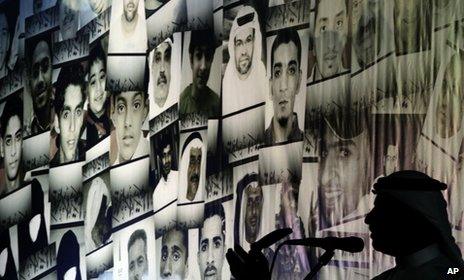Amnesty condemns Bahrain's 'spiralling repression'
- Published

Amnesty International has condemned what it says is the failure of the government of Bahrain to deliver on its promise of reform.
The human rights organisation says a "groundbreaking report has been shelved by spiralling repression in Bahrain".
The report investigated human rights abuses when an anti-government uprising was crushed last year in the Gulf island kingdom.
Bahrain has been wracked by more than 18 months of civil strife.
At least 60 people, including several police officers, have been killed. The opposition puts the death toll at 80, a figure the authorities dispute.
Covadonga de la Campa of Amnesty International told the BBC that when the Bahrain Independent Commission of Inquiry (BICI) report was released on 23 November 2011 it "seemed to be a path to reform".
However, citing the recent banning of all public gatherings and rallies, the revoking of citizenship of 31 Bahrainis and what she called "ongoing reports of torture, including the torture of children", Ms de la Campa spoke of "a worsening situation".
The Amnesty study - entitled "Bahrain: Reform Shelved, Repression Unleashed" - argues that the human rights situation in the kingdom has deteriorated "markedly".
Last year, after the uprising was put down, thousands of people were dismissed from their jobs. Almost all were Shia Muslims, who form the majority indigenous population in a country ruled by a Sunni royal family.
In the wake of widespread international condemnation of how the government handled the protests, King Hamad bin Isa Al Khalifa appointed Egyptian lawyer Cherif Bassiouni to lead an independent investigation into allegations of human rights abuse.
The BICI report proved to be a comprehensive and damning indictment.
The report's conclusions were accepted by the king, and they confirmed excessive use of force by security personnel, numerous abuses including torture in detention, as well as the sacking of more than 4000 employees in the private and public sectors.
The BICI made 26 recommendations calling for extensive judicial, legislative and policing reforms. He also called for the reinstatement of all the sacked workers.
At the time, King Hamad's decision to create an independent commission was widely hailed as a step forward. And it was seen as a unique response to the unrest that had swept through the Middle East during the Arab Spring. Even sceptical observers were surprised at the scope and independence granted to Professor Bassiouni and his team.
Perhaps even more surprising to those same sceptics was the king's acceptance of the report's findings and his commitment to undertake the reforms. That decision too was widely praised by the international community.
"Significant progress"
Last week in Geneva, the Bahraini labour minister told the International Labour Organisation (ILO) that 98% of the sacked employees were back at work, and issued a statement saying: "The ministry's efforts are aligned with the [BICI] recommendations and consistent with Bahrain's aims for reform and reconciliation".
But Karim Radhi of the General Federation of Bahrain Trade Unions (GFBTU) has said that "at least 500 people" are still out of work.
The Bahraini government continues to say that implementation of the BICI recommendations is well underway. And on Wednesday, just ahead of the one year anniversary of the BICI report, the government has released its own progress report.
However, a recent assessment by the Washington-based Project on Middle East Democracy (POMED) found that only three of the 26 recommendations had been fully implemented, another 15 partially and seven, arguably the most sensitive, had not been implemented.
Stephen McInerney, POMED's executive director, acknowledged that the government has taken steps but told the BBC: "What is lacking is real political will to move forward." He described the Bahraini government's claims that it has moved a long way down the road to reform as "not realistic".
A Bahraini government spokesperson called into question the validity of the POMED report and told the BBC "significant progress has been made".
The spokesman added: "Major reforms in the NSA (National Security Agency), MOI (Ministry of Interior) and Judiciary have been instituted; including the revocation of arrest powers from the NSA; the appointments of the Ombudsman and Special Investigative Unit have been crucial in insuring accountability for abuses."
"Only recently several officers have been charged for abusing their authority in the manner of arrest".
Responding to the Amnesty report, an organisation called Citizens for Bahrain said the human rights group had "conveniently ignored these important reforms".
"Human rights shortcomings in Bahrain are infinitely less sensational and scandalous than catastrophic abuses in Syria, Burma and Iran," a statement said.
"While Amnesty International understandably wants to keep Bahrain in the forefront of public attention - not in itself a necessarily bad thing - it is wrong to grossly miscontextualise the situation in Bahrain in order to achieve this goal."
However, Ms de la Campa of Amnesty International said the most important recommendations had not been implemented and called for the UK Foreign Office and the US State Department to bring more pressure to bear on Bahrain.
"So far what we have seen is public statements of concern. We are not seeing that being followed by a clear condemnation of the human rights situation".